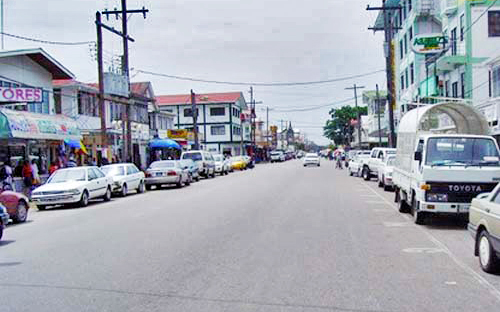Guyana Focus

(Final of 2 parts)
A ship with an incompetent captain and an inexperienced crew will most likely sink in rough seas. That’s akin to Guyana’s sugar industry which is sinking rapidly, forcing the government to take measures to abandon the country’s once prized flagship industry.
By the end of next year, it is expected that the APNU/AFC coalition government will either close or privatize all remaining sugar estates, with the exception of Uitvlugt, Blairmont and Albion.
The “modern” Skeldon factory will be first on the privatization block and most likely Enmore which has a new packaging plant, will be next.
Rose Hall, one of the largest estates, also makes a good privatization target. However, privatization – short of a fire sale – remains extremely challenging given the current state of the estates, production inefficiencies, and the problems associated with sugar cultivation. That is, unless the estates become a real-estate play and is used for other activities.
With the closure of estates, the government hopes to diversify sugar lands into other agricultural crops, including rice and livestock. Individuals would also be given the option to remain in private cane farming.
Incidentally, the fact that sugar was in trouble has been known for more than 20 years. Discussions about privatizing the industry and the closure of estates were discussed in the country’s Draft National Development Strategy which was published way back in 1996 by the former PPP administration. However, the PPP government was evidently optimistic that the industry could have been restructured and reorganized to ensure its future viability.
Plus, given the magnitude of the social and economic implications that would have resulted from rationalizing sugar (See Part 1), the then government chose to keep the industry afloat by subsidizing its operations.
It placed its’ trust in GUYSUCO’s management which not only failed miserably to execute on its strategic plan, but instead ran the industry further into the ground. The appointment of an ineffective board – whose members were largely chosen through nepotism – served no real purpose.
Although the industry was broad-sided by a plethora of problems – unfavorable weather conditions, labor disruptions, loss of preferential treatment for exports, lower world market prices for sugar, among others – it is evident that management never had a well-thought out roadmap to return the industry to viability.
The government’s optimism might have also been misplaced by increasing sugar production during the mid-1990s to the mid-2000s. In fact, prior to the PPP government taking office in 1992, sugar production was significantly lower than it is today. In 1990, sugar production was a mere 130,000 tonnes, and in 1991 it was 162,000 tonnes. Between 1992 and 2008, sugar production averaged 274,000 tonnes, crossing the 300,000 tonnes mark in three separate years.
Therefore, although declining production can be blamed for the failure of the industry, it is in reality not the underlying cause.
Rather, it is the high cost of production that made sugar unprofitable. GUYSUCO’s cost of production of sugar is estimated to be in the range of US 34-35 cents per pound, almost three times the average world market price of about 13 cents per pound.
However preferential entry into the European market masked the high cost of production and consequently the potential losses from sugar. Thus, when the European Union (EU) commenced cutting preferential tariffs in 2006, the losses were suddenly magnified.
The problem is, GUYSUCO was given years of ample warning that the EU would remove the preferential tariffs. The EU also provided the country with some US$133 million in funds to help it sustain and modernize the industry as it transitioned from the loss of preferential treatment.
To give GUYSUCO some credit, it did prepare a 1998-2008 strategic plan, but that was only on paper. The highlight of the plan was the establishment of the modernized Skeldon factory, which once operational, would bring the cost of production of sugar down to about US 12.5 cents per pound by 2008. Had management come even close to achieving this target, then sugar would not have been in the trouble it is today.
But it gets worse. When the Skeldon factory, which has an annual capacity of 500,000 tonnes, opened more than two years behind schedule, one would have thought that sugar could be returned to viability. Although the factory was plagued with mechanical problems at the outset, that was just the tip of the iceberg.
In reality, management had created a white elephant because there was never sufficient sugar cane to keep the factory operating at even 25% capacity. How could management fail to plan for an increase in cane cultivation to operate the plant efficiently? This was certainly not a mere oversight, but rather it is a clear demonstration of incompetence. And the then inept Board of Directors of GUYSUCO should be held equally accountable for the failure.
Management also banked on the establishment of a co-generation plant that would use bagasse (fibrous waste from processing sugar cane) to generate electricity. While the idea is a good one, such plant is hardly sustainable because if sufficient sugar cane is not processed to provide feedstock for the co-generation plant then it would never operate at full capacity.
What is evident is that there has always been scope to make the sugar industry more efficient. The former PPP administration relied on hope as a strategy, without taking into account the dearth of skills upon which it rested its hopes.
On the other hand, rather than putting measures in place to revive the industry, the current government has been quick to abandon it without regard to the implications of its action.
Obviously, there are a lot of political forces at play. The PPP has historically derived substantial support from largely Indian sugar workers, giving it reason to keep the industry operational. But the APNU+AFC coalition sees it as a perfect opportunity to minimize the power of the opposition’s Indian supporters.
Barring the appointment of a Commission of Inquiry on sugar to validate its actions, the current government did not examine the potential to produce value added products – such as refined and packaged sugar - to reduce the dependency on raw sugar exports. Incidentally, GuySuCo’s packaging plant at Enmore has never been effectively used.
Ideas such as ethanol and power production which have been floated are simply not feasible given the industry’s current scale of operations. Such ventures would only end up being greater failures than sugar because ethanol is subject to the same pricing conditions on the world market. Plus, Guyana would be a miniscule player in a market where scale of operations is necessary to be competitive.
In the case of generating electricity from biomass (bagasse), there is currently insufficient bagasse to sustain a power plant. For instance, if the Skeldon factory did end up processing 500,000 tonnes of cane annually, as originally planned, then there would have been sufficient bagasse to operate a power plant. Transporting bagasee from other estates to a power plant will only add to the cost of generating electricity.
Arguably, the government does not have the capital to resuscitate the industry, making privatization appear like a good option. But it is not the only option. Rather, it would take visionary management to revive the industry, which means replacing those currently in charge if changes are to be instituted – which the government can put in place without resorting to cronyism.
That would be the best option, which is now only a foregone conclusion.
Following is a statement from the movement:
The Federation of Independent Trade Unions of Guyana (FITUG) as the nation’s most representative organization of registered workers of Guyana has been following closely the unfolding situation regarding the imposition of Value Added Tax on Education. Having considered this matter from different perspectives, it is our view, that the privately-run schools, at this juncture of our country’s development and with the economic straits that we are facing, are playing a positive role in our education system. Indeed, we believe, it to be a laudable feature that is supplementing our national public school system which experiences, in instances, certain strains and inadequacies. With this in mind, it would appear that parents should not be discouraged if they opt to send their children to private school.
Let us be reminded that education is seen as key to removing our people from poverty and one would think this suggests that hurdles would not be thrown in the path of those who are pursuing it whether in state or privately-run schools.
VAT on Education, given the Government’s stated emphasis on education is certainly an unwise and clearly an unpopular decision. FITUG urges a reconsideration of this measure especially in light of the multiple tax measures which are to be borne by the people and the effects it has on the living standards of our working-people. Moreover, the massive tax revenues amassed, according to information, would strengthen the call to revisit this matter with a view to rescind such a tax as FITUG calls for. VAT on Education has coincided with the massive hike in the University of Guyana tuition which will almost certainly lead to denying many youngsters the opportunity of tertiary education. With the reduction of job opportunities arising from the deteriorating economic circumstances and now a high cost of education, the future for many youths, especially those from poor backgrounds, seems bleak at this time.
The Federation stands in solidarity with the Guyana’s Private School United (GPSU) movement and are supportive of its call for the Government to abandon this wrong policy. We call on the coalition regime to recognize that this tax will impact negatively on the education and the future of many, many of our youthful citizens. We urge the government to take into account the adverse effects that these measures can have on national development, now and in the future. In our view, the revocation of these decisions is just common sense.
The attack occurred after 8 pm, when four men, including two armed with handguns and another with a knife, attacked the owner of the business, Anthony Bashir, and two of his workers, all of whom were relieved of their cell phones.
Bashir told the media that although he usually closes early, he decided to stay open a bit longer on Friday to facilitate visitors to a “wake house,” located just two doors away. He said he was briefing his employees on the work schedule for the extended weekend when three of the four men walked in.
“One of the men walked with a gun and come pointing it at me, saying ‘Don’t move, don’t move….’ They then went ahead and pull down the shutters while the fourth man, who was masked, pull in the gate,” Bashir said.
While inside, the men reportedly started asking for the location of the light switch to turn off the light in an attempt to give those on the outside the impression that the store was closed, the businessman related.
However, according to Bashir, “a little girl who came to the store saw the masked man outside and went back to the wake house and told some people there… when they realise what was going on, they came over and the bandits inside start to panic.”
As a result, the men reportedly grabbed $30,000 in cash and $10,000 worth of phone cards before escaping through the back exit and subsequently over his and his neighbour’s fences.
Bashir said he then contacted the Leonora Police Station to report the attack and he was told by a female rank that he would have to visit the police station to lodge an official report. He said he called a second time and a patrol vehicle was sent over.
the existence of businesses,
unemployment rises

(Photo courtesy Kaieteur News)
The company has also moved to cut 10,000 jobs and eliminate 6,200 positions due to disappointing sales.
Only last month, Sears, America’s top appliance store since 1886, closed 150 stores countrywide and 250 employees were laid off in an apparent move to cut costs as the company struggles to stay afloat.
This signals that the downward trajectory of business in Guyana is not unique, since many local businesses are also making drastic cuts to their human resources in order to survive.
A computer store in Guyana has indicated its intention of closing at least two of its outlets as the entity continues to face financial challenges.
Store owners on Regent Street, Georgetown are crying foul as most of them have been forced to dig into their personal savings in order to keep their businesses afloat.
In addition to skimping salaries, some businesses were strained to the extent, where they had to take the drastic step of sending home staff and have their children do the work instead.
On Friday, a number of store owners opened up to Kaieteur News about how business has been for the past few months. Frustration showed on their faces.
One businessman in the furniture industry said that he has been doing business for more than 20 years and that the current decline in sales is the worst he has ever experienced.
While the businessman does not intend to cut salaries, he is definitely laying off members of his staff. He asserted that if the slowdown in the economy doesn’t take a reverse pattern soon, he will be forced to implement more drastic measures.
The nightmare of having to shut down operations and close their doors is becoming more and more real for many businesses.
Another businessman in the clothing sector said that while migration has never been on the agenda for him and his family, they are now thinking about it.
“If I get an offer now, I am going to take it because I think it is the only option available for my family. Things are really bad and I have been a businessman for most of my life but things are just not working out.”
When reporters went into another store, the owner and his wife were sitting at the back with their calculator.
After the reporters introduced themselves and stated the purpose for the visit, the businessman asked, “Do you know what we are doing here? We are calculating how we are going to pay our employees this week because we haven’t gotten a single sale in three days.”
The middle aged man related the struggles that forced him to lay off two of his “very good” employees, just last week.
While he was able to hold on to three others, the lack of income by the business has made paying salaries very difficult. His personal savings have been taking a brutal hit in this regard.
“They are poor and they got families to take care of, so it’s hard when you see you have to make a choice to send off people,” the man’s associate interjected.
In the technology sector, one businessman said, “My wife is here and she is assisting because I can’t afford to pay staff. Even if I cut hours, I wouldn’t afford to pay because we are not getting sales.”
Although Guyanese women are known to be extravagant when it comes to looking good, it would appear as though the economic slowdown is even causing them to be penny-wise.
One businesswoman in the cosmetic sector explained to this publication that she too has had to dig into her pocket for the past three months to pay employees, as well as rental for the business space.
“I don’t know how (much longer) I can keep up. This is a lot of investment and the tax and VAT (Value Added Tax) killing us more.”
Abhi Manyu, a manager with Flex Enterprise, a Suriname company which opened its door late last year, said that business was good in December, but sales started to decline in January and got even worse as of recently.
Also adding his views on the downward slope of business was A Bin, a Chinese National who operates Gao De Store, a household appliance store on Regent Street.
“Things no good…slow, slow, slow. You see no customer. Last year mo betta; this year bad, bad. Me no hiring, me can’t pay,” A Bin stressed.
A businesswoman on Robb Street, Georgetown, said that she sold one item worth $2600 last week. “Imagine, $2500 for a week and I have three employees to pay $12,000 each, plus rent at the end of the month. I don’t know how I am going to continue like this but I am going to have to lay off staff. I am only keeping them to see if business will pick up,” the woman said.
An East Street, Georgetown businessman said that he sent off two staffers last week and is planning to send off another one in the coming week.
Kaieteur News had previously reported on the retrenchment occurring in mainly the private sector. The businessmen and women who spoke with this newspaper last Friday are almost at their wits end.
If the economic condition does not adjust very soon, business on Regent Street may take on a whole new look – a look that showcases more closed doors than open stores.

This latest development comes at a time when Rasul remains under investigations for money laundering, relating to his gold dealing activities. His case has been riveting the nation over the last few weeks.
One of the biggest gold dealers, the Bartica businessman fell from grace last month after he was accused of overseeing an almost $1B fraud on the Bartica branch of the Guyana Bank For Trade and Industry (GBTI).
His arrest and charge for fraud sparked a massive investigation which saw a number of law enforcement agencies zeroing in on his operations which involved the purchase and sale of gold of over $15B last year.
His activities reportedly had far-reaching consequences with three senior officials of the Guyana Gold Board (GGB) being sent home over a week ago on administrative leave to facilitate a probe by the Special Organised Crime Unit (SOCU), an arm of the police, into possible money laundering.
According to reports, last month, the gold dealer ran afoul of GBTI after he withdrew $950M from his account at the Bartica branch of GBTI. Police said that he issued cheques drawn on his Citizens Bank account. However, he allegedly knew that the Citizens Bank account had been closed yet reportedly went ahead and wrote up cheques and deposited it at GBTI.
Reportedly, the GBTI branch manager failed to conduct the necessary checks to ensure there were funds available and instead allegedly authorized the payout to the gold dealer and his representatives.
The bank's General Manager, Lisaveta Ramotar, her deputy, Andrea Seelochan and Compliance/Legal Officer, Suzanne Bullen, were all sent on administrative leave by the Ministry of Natural Resources. Rasul was slapped with several fraud charges and placed on $3M bail.
Former Chief Justice (ag), Ian Chang, who retired earlier this year, has been granted a fiat by the Director of Public Prosecutions to be a special prosecutor in the fraud case against Rasul.
Rasul’s activities with the GGB also came under the microscope and the matter was handed over to SOCU by Government.
It was alleged that Rasul was running a scheme where instead of his gold dealing company, he used a mining company, R. Mining Inc., to sell gold to GGB. In so doing, he was not required to pay a two percent tax.
Somehow, no one at Gold Board noticed the red flags that it would have been impossible for R. Mining to produce and sell gold daily, sometimes as much as six times.
It is estimated that GRA, as a result, lost about $100M in taxes in three months alone, late last year because of the scheme. SOCU is checking to see whether there were any collusion with GGB.
It was found that Compliance/Legal Officer Bullen was the one who helped form Rasul’s company, SSS Minerals Trading Enterprise, which was later issued a dealer’s licence by her employer – the Guyana Gold Board.
Ramotar last week voluntarily submitted a written statement to SOCU which was later released to the media.
The official claimed that she never ordered Bullen to form the company. She also insisted that GGB was not responsible for verifying the production – where the gold came from, and that her mandate was to buy.
It was pointed out that the Guyana Geology and Mines Commission received regular reports. So too had the Financial Intelligence Unit (FIU).
In recent weeks, SOCU and GRA have raided business and residential properties of Rasul and his business associates, seizing cash, luxury vehicles, bikes and even a jet ski.
Several workers and associates have been detained and questioned during the investigations.
The sewage tank located in close proximity to the prisoners’ lock-ups and the entrance to the prisoners’ chute leading to court one and two overflows especially when it rains. When this occurs the prisoners would have to use the stairway to enter and exit the different courtrooms. The sewage, which obviously has an unbearable scent, floods the main entrance for Courts One, Two, Eight and Nine and also the Collecting Office, which are situated on the lower flat of the two-storey court house.
Many persons including reporters and police ranks stationed at the court have raised concerns about the situation which has become intolerable. In some instances, it has been observed that individuals would walk into the filthy water without being aware of what they are stepping in.
A clerk who accompanied her best friend to the court last Friday said, “I was not allowed to enter the courtroom because of the colour clothing I was wearing, so I told my friend I would sit on the bench outside the courtroom at court six and wait for her. A few minutes of me sitting there was the worst I have felt in a long time. I smelt something that automatically gave me a headache, when I looked around to see where the scent was coming from I saw tissues and faeces floating in water. I felt so sick I had to get up and go home… that was unbearable.”
“The condition gets worse and worse every time I come here for the past two weeks. I have been coming at this court because I have a matter and every time I come the first thing I does smell is p*** and sh**. One time I stand up on the step and if you see faeces that was floating around and the police officers who are stationed in that area had to eat their lunch right there. That could never be fair, with all the money the government spend,” Leonie Smith, a frequent visitor lamented.
A reporter highlighted, “Children accompany their parents at courts daily to collect maintenance. The stench is unbearable and to crown it off police officers have to stand up in that nasty area to perform their duties. Some of the ranks would also be seen eating there because they cannot neglect their duties. Almost every week this sewage overflows and all they doing is sprinkling jeyes fluid. Some persons would spray air freshener and eat and dwell under that condition.” (Kaieteur News)



To advertise in ICW call
Call 905-738-5005